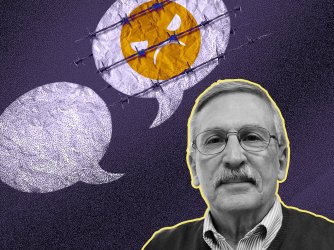Table of Contents
Big Brother: Coming to a Campus Near You
Today’s Inside Higher Ed reports on the effort by Senate Majority Leader Harry Reid of Nevada to require colleges to take more direct action in fighting “campus based digital theft” of movies and music. File sharing, popular even when I was in college in the late 1990s, is by all reports going on in epic proportions on today’s campus. The speed and unfiltered nature of campus computer networks is largely responsible for making this possible, and the fact that so many young adults are connected in one place makes it part of the culture on campus. Simply put, it’s easy to trade music, or even whole, fairly high-definition movies and TV shows, with your friends on campus and beyond.
Sen. Reid would like to change that by requiring colleges to put into place technological obstacles to this file sharing. The IHE article does a pretty good job of explaining colleges’ objections, which are that the technology really doesn’t work well, and it might end up blocking legitimate network traffic along with illegal file sharing.
What does this have to do with freedom of expression? After all, the First Amendment does not protect your right to violate copyright laws. However, the potential solutions to this problem are solutions that should worry civil liberties advocates. For in order to block illegal file sharing but allow legal file sharing, there is only one option: find a way to inspect the contents of the files being traded, or the hard drives of students on campus.
FIRE has repeatedly lamented that Facebook and other social networking sites have granted administrators a view into student interaction that was formerly outside administrators’ control—a view that is increasingly leading to punishment for protected expression. The effort to stop illegal file sharing, however, could easily result in a far stricter regime of censorship. The infrastructure required to truly satisfy the recording industry’s desires would put college administrators in the position to inspect every bit and byte of network traffic through the college’s system (or, worse, on users’ hard drives). When the FBI tried something like this to catch actual criminals (its Carnivore e-mail “wiretapping” system), it resulted in an enormous uproar. Now the Senate is proposing that colleges put in place an even more robust system of monitoring that is designed to constantly monitor every student—whether or not they are even suspected of a crime—and that would enable a massive expansion of the reach of speech codes and selective repression.
When you get down to it, this is nothing more or less than a variant of wiretapping—a procedure that is accepted in our society because only the police can legally do it, it is hard to get a warrant to do so, and because it is justified as a tool for use against mobsters, terrorists, and other undesirable elements of society. Requiring colleges to run a huge wiretapping system on every single college student is something else entirely and multiplies the opportunities for abuse by a million-fold. The possibilities for censorship—or even blackmail—are immense. And if the technology can be used to stop one kind of forbidden activity—illegal file sharing—it can certainly be used to stop, for instance, “material, which in the sole judgment of the University is offensive.” (Thanks, Northeastern University.) Senator Reid should carefully consider all the ramifications of this legislation before requiring America’s universities to turn college students’ computers into the telescreen of modern times.
Recent Articles
FIRE’s award-winning Newsdesk covers the free speech news you need to stay informed.

Should the First Amendment protect hate speech?
In America, hate speech is generally protected by the First Amendment. But should it be? Today's guest is out with a new book, "." W. Wat Hopkins is emeritus professor of communication at Virginia Tech, where he taught communication law and...

Here’s what students need to know about protesting on campus right now

Kansas takes a stand for intellectual freedom
